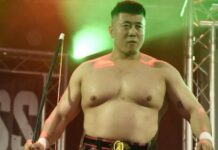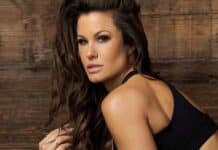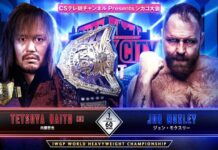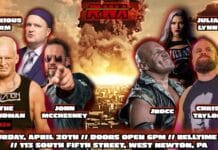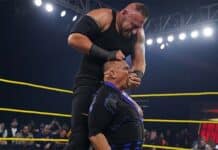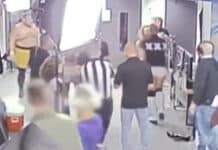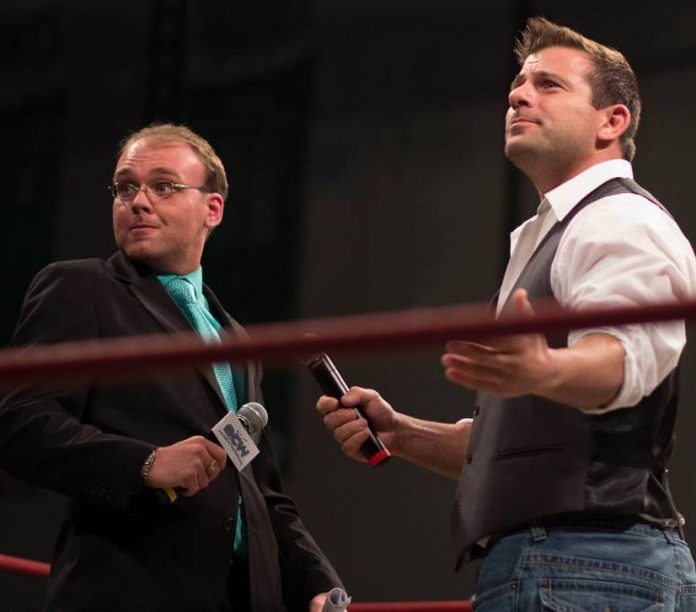
In February of 2013, as blustery snow fell outside, I found myself inside a dingy building that was going to host an independent card with roughly three and a half years of commentary experience at the time. As space heaters blasted to keep the venue from becoming an ice box, preparations were actually being made for the Pro Wrestling Express’ return to television on WBGN, a now-defunct local channel that years earlier featured blocks of various wrestling content of different groups at different times. Ironically, When I was in middle school, I discovered one of the local leagues, IWC on the same channel. Even more ironic than that, one of the voices I heard on that original Saturday night program in 2003 was a young Joe Dombrowski, who went on to be known for his ventures throughout the independent scene. A decade later, on this snowy night in Western PA, I was paired up with Joe to kick off the newest season of the previously mentioned PWX TV era. I had been told before that I had always done a solid job on the mic, which is why I kept the spot as their play-by-play commentator since mid-2009, but I knew Joe’s level of experience brought a whole new aspect to the broadcast. In the next four years that we spent sitting next to one another, calling matches in the gritty environment, I learned more working with the veteran commentator than I had anyone else previously. After that first WBGN broadcast, Joe mentioned to me that I did fine and just needed the polishing through experience, which is a similar dynamic that longtime wrestling voice, Jeff Gorman provided for him year earlier. And Joe was right, as I learned the “glue” of sound bytes through the opportunity to work with him for those next few years.
Since that time in the dilapidated venue in a less than reputable part of town, both of us have moved up the ladder in our own ways. Joe, a true hustler, finds himself in a different state almost every weekend, while I moved on to a more prominent role on the local scene, announcing more well-known events around Pittsburgh. While Dombrowski is known so much for the prepared, professional style he brings to the mic, his personal passion for the industry sometimes doesn’t get the recognition it deserves. Aside being forced to spend an inhumane amount of time of time with the carny Virgil, who is Joe Dombrowski? Furthermore, what has fueled his dedication to work in the professional wrestling genre for his entire adult life?
“To me, wrestling is my passion, it’s my life. It’s what’s hooked me since the age of five, and it’s never let go. It’s an outlet for emotions, both good and bad. It’s an escape, but it’s also everyday life. Wrestling is everything and sometimes I’m scared to think of where or what I’d be without it,” Dombrowski explained.
Similar to most north east fans, Joe grew up as a diehard WWF fan of the early-90s and became virtually obsessed with every facet of the spectacle that beamed through his television with its cast of larger-than-life characters. Christmas and birthdays were highlighted with the excitement of receiving new Hasbro figures or wrestle buddies. A quiet bookworm, Joe read immensely during his youth and became even more fascinated with the story telling of sports entertainment. As time went on, he devoured as much history of the industry as he could find, thumbing through musty magazines to read original reports of the territories or tracking down grainy VHS copies of classic footage before modern technology allowed such easy access to so much content. He also developed a deep appreciation for the mindset that goes into the building blocks of the drama of the action, studying the behind-the-scenes accomplishments of famous bookers, insider lingo for the matchmakers, such as Eddie Graham, Kevin Sullivan, and Dusty Rhodes.
His diligent studying of the sport led him to want to become more involved, and at just 17, he made one of his first deals in the business, bringing the International Wrestling Cartel, run at the time by one of the godfathers of Pittsburgh wrestling, Norm Connors, to his high school for a fund raiser. Without the genetics or natural athletic ability, power slams weren’t in the cards for him, but when Connors wanted a tie-in with the school, that eventually led to Joe putting his prose down in front of the mic.
“The learning process of a new announcer is a very difficult one, because there really isn’t any formal ‘training’, it’s a lot of learning as-you-go. I was very fortunate to be surrounded by a very experienced group of announcers – Jeff Gorman, Anthony Kingdom James, Chuck Roberts – who were able to help cover my weaknesses, lead me along, and give me the hands-on experience I needed to sink or swim and keep me in check along the way. I owe a huge debt of gratitude to them all. Beyond that, I tried to immerse myself in the stories and personalities around me, both on-air and writing for IWC’s site. The more I knew what promoter Norm Connors wanted, the better I could try to convey that to the audience,” Joe commented.
So, by 2003, the lifelong fan transition that fandom into an introduction to the industry, making his first regular gig in wrestling IWC’s previously mentioned local TV spot alongside the talented Kingdom James and one of the original voices of the independent circuit, the esteemed Jeff Gorman. The trio had the chance to call bouts for steel city mainstays like Super Henti, Shirley Doe, and Dennis Gregory on the same cards that also featured names like AJ Styles, Christopher Daniels, and CM Punk.
“Joe’s drive and passion to be a great wrestling announcer was evident from day one. I consider our team with Kingdom James to be the greatest announcing trio ever. When I stepped aside, I knew Joe would be able to fly the ship in IWC, and I am so proud to see him succeed in ROH, TNA and all over the world,” Jeff Gorman said.
Within just a few years, Dombrowski had developed a solid highlight reel and a reputation as a wordsmith around western PA that his name was randomly mentioned during a conversation about an upcoming UK project, 1PW, the group that rose to prominence extremely quickly and declined even faster. Still, when the 20-year-old American had the chance to make a few trips across the pond, he gained valuable experience, both in knowledge and the harsh reality of some of the pitfalls of wrestling.
“It was such a crazy experience, looking back on it, especially at only 20 years old. I wish there had been someone in place on the financial end that had a little more vision and fiscal responsibility, and I wish there had been someone on the creative end to better regulate there as well, because it just wasn’t organized the way it could have been when I was there. When I left, the shows were sellouts, but the company was still bleeding money. Being let go was the first real big “wind out of my sails” moment as far as a step or two backwards. I still had regular work in IWC in Pittsburgh, and I had just started with Cleveland All Pro Wrestling under JT Lightning,” Dombrowski remarked.
As the mid-2000s continued, the enthusiastic youngster began working for the late JT Lightning, considered by many to be one of the pioneers of the Cleveland scene. JT’s organization and its run on their local market TV led to Joe working with other groups in the area, producing and booking countless names of the independent circuit. His “Prime Wrestling” series has an extensive library with many hidden gems, including the early years of NXT star, Johnny Gargano. The once-aspiring matchmaker wasn’t just a dreamer, but actually went out and accomplished the goal to produce live cards, often putting dozens of hours in prior to events, something that had its positives and negatives. Late-night writing sessions had him scribbling down detailed notes that would later get the chance to play out on-screen.
“The best part is being able to create, produce, and see a young talent start to ‘get it.’ So many talents have come through doors of events I’ve done that have gone on to great success, and I take credit for none of it, that’s all them, but I’m honored to be a small part of their journey, and maybe help one or two light switches get flipped on or doors open along the way. Whether it’s Johnny Gargano a decade ago, or Atticus Cogar now, I’m always so proud to watch a talent grow, develop, and find themselves. The right character in the right story conveying the right moment, man, it’s magical. The least fun aspects are the opposite, there’s a lot of grunt work associated with any type of booking gig. The wants of the promoter, of the talent, how the fans react, and how that all alters your vision along the way, and before you even get there, you have to make sure you have the scheduling and availability of about 40 different people in order and be able to cycle them in and out as seamlessly as possible,” Joe explained.
By 2010, he was well established as a voice of the indys and received his biggest opportunity at the time, the chance to broadcast for Ring Of Honor, which was still independently owned when he debuted there. After a handful of shows, the company was sold and with a change of ownership came a change in direction, as those from new management wanted a more familiar name for its new platform. Disappointed, but not discouraged, Joe continued his hustle, working on cards every weekend and just a few years ago, the grind paid off when he became the exclusive announcer for their Future of Honor division, something that he considers one of his favorite current projects.
“I’m proud to say I’ve always been a part of the ROH family, popping up here and there over the years when I can lend a hand. I really enjoy taking part in Future of Honor and the ROH Online Exclusives present day because it gives me a chance to work with young, hungry talent who have the same excitement I had in 2010, and still have today, and are so excited to have their stories told,” Joe said.
As technology continued to improve, Joe tried to say ahead of the curve, offering a voice over service that allows companies from across the country to hire him without the expensive transportation costs. When he’s not working in his home office, a room with memorabilia stretched across the walls, he produces many digital projects, such as “The Montreal Theory” or a more recent look at Les Thatcher’s HWA. The concept of a deep dive on the controversy of Survivor Series 1997 was sparked during a casual conversation with Steve Corino, and Joe’s natural curiosity for conspiracies like the JFK assassination peeked his interest to examine the drama that indirectly led to some of the biggest business in the history of the industry.
“We are all competing for a finite amount of disposable income from a finite amount of wrestling fans and, while when I started expanding my merchandising, iPPV was an its infancy, and you had to seek out these products, now literally everything is at your fingertip, and usually bundled together at a very low price. So for me to not have the clout of a WWE Network or Honor Club or New Japan World, I need to think differently compared to everyone else. I can’t realistically hit that huge mainstream wave, but if I take a different approach to it, I can find some cool hidden gems that can appeal to a niche of the sub-culture and carve out my own piece of the pie,” he said.
The usually shy Dombrowski during the weekdays was able to project himself through calls of a suplex, swerves, or a heel turn. He found a place for himself and fit in with some of the most eccentric and unique individuals of the wrestling industry. But, for years, Joe still felt a sinking weight on himself because of his sexual orientation, could he be accepted as gay in what is often typecast as a testosterone-driven sport?
“Outside of wrestling I’m a very quiet, private person. I’d rather just blend in with the crowd and exist peacefully. I was always an introvert and always battled confidence issues and social anxiety. The decision to come out came hand in hand with turning 30. When both numbers in your age change, I think you automatically step back and take a look at your life, for better and worse, no matter who you are. I did that, and I just wasn’t happy personally. I felt like I couldn’t be myself, like I had to live a double or triple life. I was always scared to death to do it, especially having grown up in the 90s where doing so was practically scandalous, and having the anxiety and confidence issues I battled anyway. I finally just hit a point where I knew I needed to do it in order to be happy and mentally healthy, and that was more important to me than anybody’s opinions. I can’t put into words in this space how positive of a move that was to me, I’m far from perfect, but it was a huge weight off of my shoulders,” Dombrowski said.
His announcement was met with overwhelming support and positivity, as those on the wrestling scene still saw him for the quirky personality that enjoys Tim Hortons and impersonating Stu Hart. With a clearer mind than ever, Dombrowski continued to grind forward and his endless hours on the road paid off with additional international exposure, as he joined the English broadcast team for AAA’s Triplemania event at the recommendation of Konnan and Kevin Kleinrock, who has produced a myriad of wrestling projects.
“My debut in AAA doing TripleMania XXVII last year, my international work in Canada, Mexico, England, and most recently Qatar, and so many of the content I’ve been able to create and produce through PWO, PRIME, Premier, Welterweight and originals like Montreal Theory, Finding Zach Gowen, or The Legend of Virgil & His Traveling Merchandise Table are all highlights. I’m not a ‘WWE or bust’ kind of guy, but I’m always looking for new projects, new opportunities, new promotions. Short-term, I’d love to do more and more with ROH and AAA, and keep churning out side projects as well. Whatever comes up from here, I’d like to think I’ll be ready for it. But, most of all, the main goal is to be comfortable financially, have the freedom to do the things I want and I love, and more than anything to be happy,” Joe said.
Joe Dombrowski is without question one of the voices of independent wrestling, but perhaps more importantly than that, he not only grew up in wresting, but found his own identity through wrestling. If he’s not sitting ringside at a broadcast in any number of states or watching classic episodes of The Twilight Zone, he will often watch obscure original broadcasts of wrestling shows because that’s how much passion he has for the business. There are very few currently on the indy scene that have dedicated the amount of countless hours and late nights to the sport that he has, and perhaps the most poignant aspect to his story is that with enough dedication success can be achieved in the professional wrestling industry.
For more information on all of his past and upcoming projects, you can go to www.Joe-Dombrowski.com or visit his digital archives with hundreds of hours of content at www.http://ProWrestlingLibrary.com
You can find him on social media:
Facebook:Joseph Dombrowski
Twitter @joe_dombrowski
IG:Joseph_Dombrowski
What do you think? Comment below with your thoughts, opinions, feedback and anything else that was raised.
Until next week
-Jim LaMotta
E mail [email protected] | You can follow me on Twitter @jimlamotta

